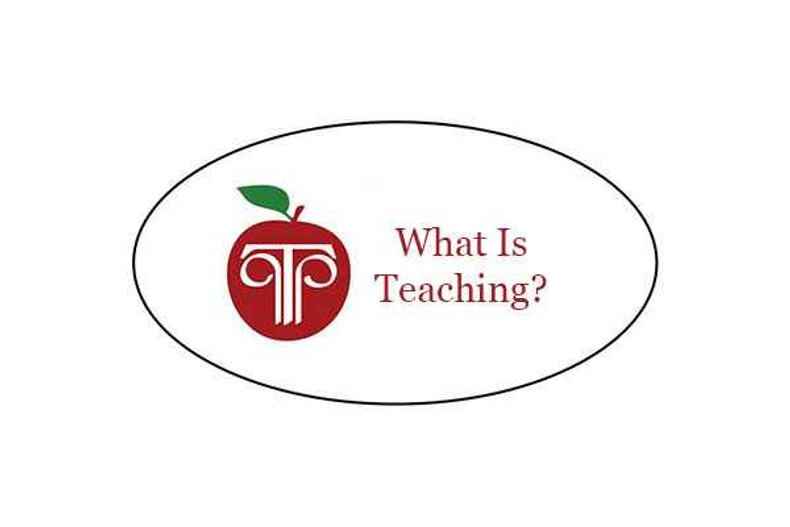If you want a sterile, black-and-white dictionary definition of teaching, it is "imparting knowledge." In terms of teaching in K-12 classrooms where fast-paced, full-color lives meet education, teaching must be defined as the art of helping students learn.
I stood in front of a class of average (non-college-prep) eleventh-graders one day, enthusiastically imparting literary knowledge to them. What I saw was blank, mostly uninterested faces staring back at me. Was any of what I was saying being retained? Probably some fraction of it, but mostly...no. Was I teaching? Well, technically, yes I was. Were my students learning? Hmmm...not so much. It was at that moment I learned that teaching is not just imparting knowledge.
Teaching is an art, not a science.
Educators in the hallowed halls of academia try to make it a science, to define and categorize, list and label all the parts of the thing we call "teaching," but ultimately, it defies scientific processes because there are so many variables. There is value in defining and labeling and categorizing to help us talk about the variables, just as there is value in knowing the parts of speech and how they work in our language so we can discuss it--but in the end, language and teaching are fluid art forms.
There is nothing so fun to watch as a talented artist creating a beautiful sculpture or painting, and there is nothing so wonderful to see as a talented teacher helping students learn. Can you take any person on the street and show him the process of painting? Yes. He can follow the steps of the instructions given and can produce a painting. Can you take a person on the street and show him the process of teaching? Yes. He can follow the steps of the instructions and pass or fail students. But here's the thing: teaching, like art, is a talent. An artist with talent will produce more beautiful art than one without. A natural-born teacher will always have more success than one without talent who simply tries to methodically follow the scientific steps outlined in a teacher education course.
Why? Because of the variables. Teaching is the constant juggling of a multitude of variables and it is impossible to write down a rule for every situation. Even if there were such a rule book, you would spend all your time looking up what to do. Teaching is the constant process of evaluating, planning, evaluating, responding, evaluating, and finding solutions--solutions which often require creativity, empathy, ingenuity, and sometimes luck.
Teaching is intimate, personal, and sometimes complicated.
Simply standing in front of a class and imparting knowledge is not. If our goal is to help students learn rather than to simply make knowledge available, we have to be part psychologist, part detective, part friend, part parent, as well as part judge and jury. We have to have empathy, understanding, knowledge, patience, and a keen eye for truth. Good teachers have an amazing skill set which they apply in innumerable ways to lead the learning process and to respond to students' individual needs.
Even for exceptionally talented teachers, teaching is hard work. It requires constant thought and almost constant action to get to know students and assess where their skills are, plan classwork, carry out the plans, grade papers, figure out how to deal with issues that arise, and do extra-curricular duties. Beyond that, the emotional stress of not only dealing with helping students learn but interacting with parents, co-workers, and administrators can be draining as well, especially in often tense situations. Oh, and none of the emotional stress of tense situations or being involved in students' lives is supposed to spill over into the classroom. A good teacher has to remain positive, calm, and collected. Add to that going to school for continuing education requirements and the demands of teachers' own personal family lives, and it's no wonder teacher burn-out and teacher turn-over are so high.
Teaching should be more than a career; it should be a vocation one does because one cares about kids, about people, about society, and about the world.
Almost every teacher I know started teaching because he or she cared. Some burned-out or became jaded, and for them teaching turned into a job, something they were tied to for a pay check, benefits, or retirement plans. That is a sad reality. The joy of teaching sometimes gets buried under layers of exhaustion and frustration.
For others who were either lucky to be in good schools or had the personal make-up to handle things without becoming practically incapacitated by exhaustion and frustration, joy still exists in teaching. For them, the art of finding out where a student is, knowing the next place the student should be, creating a way for the student to progress to that next place, and working with the student to get there in spite of any obstacles is a rewarding challenge they still enjoy.
So, what is teaching?
All of the above. There is no single sentence that can define what a teacher does to help students learn. Thousands of books have been written about teaching methods and teaching strategies. In the end, a teacher has to look at her own individual students and determine how she can best help them learn.




